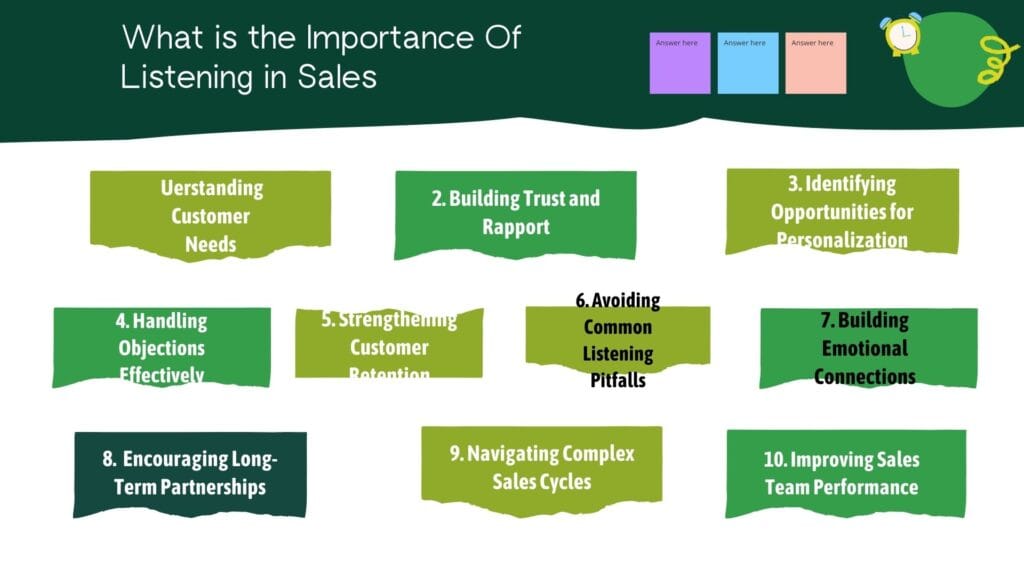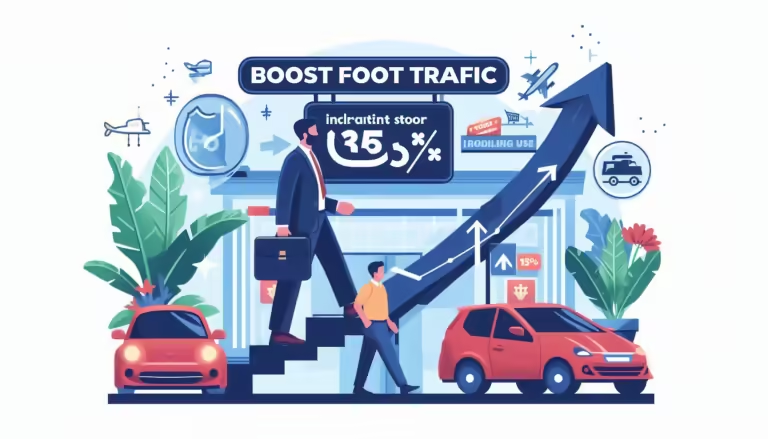What is the Importance of Listening in Sales?

This article explores why listening is essential in sales, supported by real-world examples, tips, data points, and insights from industry experts
What Is Listening in Sales?
Definition:
Listening in sales is not just hearing words; it’s understanding the customer’s needs, concerns, and goals. It involves paying attention to verbal cues, tone, and even non-verbal communication to gain insights into what the customer truly values.
Why It’s Important:
Customers want to feel heard and understood. If a salesperson doesn’t listen, they risk making irrelevant pitches that don’t address the customer’s pain points. Active listening demonstrates empathy and builds trust, which are crucial for long-term relationships.
How to Do It:
- Practice Active Listening: Show you’re engaged by nodding, maintaining eye contact, and using affirmations like “I see” or “That makes sense.”
- Paraphrase and Clarify: Repeat what the customer says in your own words to confirm understanding. For example: “So you’re looking for a solution that saves time, correct?”
- Avoid Interrupting: Let the customer complete their thoughts before you respond.
Case Study:
John Doe, Senior Sales Manager at Salesforce, recalls a time when listening changed the trajectory of a deal:
“We were pitching our CRM to a large retail chain. Initially, the client seemed hesitant. By truly listening, we learned their main concern was data integration with their existing tools. Addressing this specifically helped close the deal.”

1. Understanding Customer Needs
What It Is:
Listening helps salespeople uncover the true needs behind what a customer says. Often, customers don’t explicitly state their problem; they describe symptoms.
Why It’s Important:
A study by HubSpot found that 69% of customers want sales reps to listen to their needs before making a pitch. Misunderstanding needs can lead to lost opportunities and dissatisfaction.
How to Do It:
- Ask Open-Ended Questions: You can use questions like “Can you tell me more about that problem or challenge?” to encourage customers to share details.
- Focus on Pain Points: Listen for recurring issues or frustrations the customer mentions.
- Take Notes: Jot down key points during conversations to show you’re serious about their concerns.
Example:
A customer says, “Our team is struggling with productivity.” A good listener will probe deeper.
2. Building Trust and Rapport
What It Is:
Listening helps establish a connection where the customer feels valued and respected. It shows that the salesperson prioritizes their needs over pushing a product.
Why It’s Important:
Trust is the cornerstone of any successful relationship. A study by Edelman found that 81% of customers need to trust a brand to make a purchase.
How to Do It:
- Show Empathy: Reflect their feelings. For example: “I can totally understand that how frustrating that must be.”
- Be Patient: Let the conversation flow naturally without rushing to the sale.
- Share Relevant Stories: Relate their situation to previous customers you’ve helped.
Expert Insight:
Mary Barra, CEO of General Motors, emphasizes:
“Listening is basically not just a skill; it’s a mindset. Building trust starts with understanding the other person’s perspective. Only then can we create meaningful solutions.”
3. Identifying Opportunities for Personalization
What It Is:
Listening allows salespeople to tailor their approach to each customer’s unique preferences, industry challenges, and goals.
Why It’s Important:
According to McKinsey, 71% of consumers expect personalized interactions, and 76% feel frustrated when this doesn’t happen.
How to Do It:
- Identify Keywords: Listen for industry-specific terms or challenges.
- Adapt Your Pitch: Frame your product as a solution to their specific issues.
- Use Their Language: Reflect their terminology to show alignment.
Tip:
If a customer mentions their focus is “cost reduction,” your pitch should emphasize affordability and ROI.
4. Handling Objections Effectively
What It Is:
Listening helps you understand the root cause of objections, enabling you to address them meaningfully.
Why It’s Important:
Objections are opportunities to build trust. When customers feel their concerns are understood, they’re more likely to reconsider their stance.
How to Do It:
- Acknowledge Their Concerns: Say, “That’s a valid point.”
- Probe Further: Ask, “Can you elaborate on why this aspect concerns you?”
- Provide Data-Driven Solutions: Use facts to address objections.
Case Study:
When a software company faced pushback about pricing, the sales team listened to concerns about ROI. They shared data showing a 25% productivity increase for similar clients, turning the objection into a sale.
5. Strengthening Customer Retention
What It Is:
Listening isn’t just for closing deals; it’s essential for post-sale engagement to ensure customer satisfaction.
Why It’s Important:
Their is a study did by Bain & Company, They found that a 5% increase in customer retention can boost profits by 25% to 95%. Your happy customers are also more likely to refer your product/services to others.
How to Do It:
- Conduct Regular Check-Ins: Ask how the product/service is working for them.
- Solicit Feedback: Use surveys or direct questions like, “What can we do better?”
Example:
An e-commerce platform increased retention by 20% after implementing features suggested by its top customers during listening sessions.
6. Avoiding Common Listening Pitfalls
What It Is:
Recognizing and avoiding behaviors that undermine active listening, like distractions or making assumptions.
Why It’s Important:
If you did a mistakes in listening can lead to misunderstandings and damaged relationships.
How to Do It:
- Eliminate Distractions: Put your phone away during meetings.
- Stay Neutral: Avoid forming judgments before the customer finishes speaking.
- Practice Mindfulness: Focus entirely on the conversation.
Expert Tip:
Simon Sinek, Leadership Expert and Author, advises:
“Listening is not about crafting the perfect response. It’s about being present and understanding the other person.”
7. Building Emotional Connections
What It Is:
Listening allows salespeople to understand a customer’s emotions, whether it’s frustration, excitement, or concern. By addressing these emotions, they can build a deeper emotional connection.
Why It’s Important:
People often can make their purchasing decisions based on their emotions and also justify them with logic. A study by Capgemini found that emotionally engaged customers are three times more likely to recommend a product and twice as likely to repurchase.
How to Do It:
- Identify Emotional Triggers: Pay attention to changes in tone or words like “frustrated,” “overwhelmed,” or “excited.”
- Respond to Feelings: For example, say, “It sounds like you’re passionate about finding the right solution—let’s make that happen.”
- Use Stories to Connect: Share testimonials or relatable examples that evoke similar emotions.
Case Study:
A luxury car salesperson listened to a customer expressing pride in their family achievements. Instead of focusing on technical specs, they highlighted features like safety and comfort for family trips. The customer felt understood and made the purchase.
8. Encouraging Long-Term Partnerships
What It Is:
Listening transforms one-time transactions into lasting partnerships by focusing on mutual growth and trust.
Why It’s Important:
According to a study by Harvard Business Review, 89% of B2B decision-makers believe that strong relationships with suppliers influence their decisions to continue partnerships.
How to Do It:
- Focus on Their Goals: Ask questions like, “Where do you see your business in five years, and how can we support that?”
- Be Proactive: Offer insights or solutions even before they ask, based on what you’ve learned about their needs.
- Show Commitment: Follow up regularly and provide consistent value, even when no immediate sale is involved.
Expert Insight:
Daniel Pink, The Author of “To Sell is Human” says:
“The best salespeople aren’t just closers—they’re builders. Listening helps them nurture relationships that stand the test of time.”
9. Navigating Complex Sales Cycles
What It Is:
In B2B and enterprise-level sales, the process often involves multiple decision-makers and lengthy discussions. Listening helps identify the priorities and concerns of all stakeholders.
Why It’s Important:
The Gartner reports says that the average B2B purchase decision involves at least 6-10 stakeholders. Each stakeholder has unique concerns, and failing to address them can derail the sale.
How to Do It:
- Map Stakeholders: During conversations, note each person’s role and concerns.
- Align Your Solution: Demonstrate how your product addresses the varied needs of each decision-maker.
Case Study:
A cloud computing company closed a $1M deal after listening to technical concerns from IT staff and budget constraints from the finance team. By addressing both perspectives, they gained unanimous approval.
10. Improving Sales Team Performance
What It Is:
Listening skills aren’t just for individual sales reps. Teams that listen to feedback from customers and colleagues perform better collectively.
Why It’s Important:
A study by Salesforce found that high-performing sales teams are 3.5 times more likely to collaborate internally and incorporate customer feedback into their strategies.
How to Do It:
- Team Feedback Sessions: Regularly review customer interactions and share insights across the team.
- Train for Listening: Conduct role-playing exercises to improve active listening skills.
- Use CRM Tools: Capture customer feedback in a centralized system for team-wide access.
Tip:
Use tools like Gong.io or Chorus.ai to analyze sales calls and identify areas where listening could be improved.
Example:
A tech company noticed a pattern of customer complaints about implementation delays. By listening to customer feedback and collaborating, the sales and support teams created a smoother onboarding process, increasing customer satisfaction by 30%.
Conclusion : What is the Importance of Listening in Sales?
Listening is the backbone of successful sales, and each of these points highlights how it can transform customer interactions and drive tangible results. Whether it’s building emotional connections, fostering long-term partnerships, navigating complex sales cycles, or improving team performance, listening ensures every touchpoint is meaningful.
By embedding these practices into their approach, salespeople can create lasting impacts, ensuring not just a sale—but a satisfied, loyal customer
FAQs
What does listening mean in sales?
Listening in sales means fully understanding what the customer says, including their needs, concerns, and goals. It’s about focusing on them rather than just waiting to pitch your product.Why is listening important in sales?
It helps build trust, understand customer needs, and tailor your solutions. When customers feel heard, they’re more likely to trust you and buy from you.How does listening help in building relationships?
Listening shows respect and empathy. It creates a connection where the customer feels valued, which strengthens relationships and encourages loyalty.Can listening help close more sales?
Yes! When you listen, you can present the right solution for their specific problem, making it easier for the customer to say yes.What’s the difference between hearing and listening in sales?
Hearing is just noticing sounds. Listening means understanding the meaning behind the customer’s words and asking questions to clarify.What happens if a salesperson doesn’t listen?
They risk offering irrelevant solutions, losing the customer’s trust, and missing the sale altogether. Poor listening can damage relationships.Does listening help with handling objections?
Absolutely. By listening to the reasons behind a customer’s hesitation, you can address their specific concerns and find ways to resolve them.Can listening make a difference after the sale?
Yes! Listening to feedback after the sale ensures customers feel supported, helping with retention and encouraging them to refer others.What’s one quick tip for better listening in sales?
Put yourself in the customer’s shoes. Listen as if you’re trying to solve their problem, not just sell a product. This mindset shift makes a big difference.
Share this post



Chiranjeev Jaiswal
Chiranjeev Jaiswal (M.B.A. and P.G.D.M.in Marketing from IM-BHU) launched "Vibrant Marketer" out of a deep passion for all things marketing. After years of working in the industry, he realized that marketing success isn’t about following the same playbook—it’s about staying ahead of the curve and thinking outside the box.







